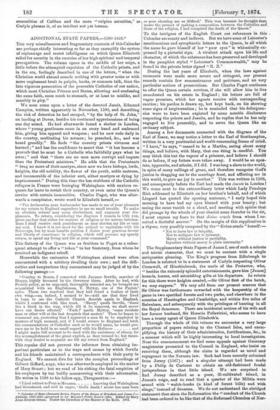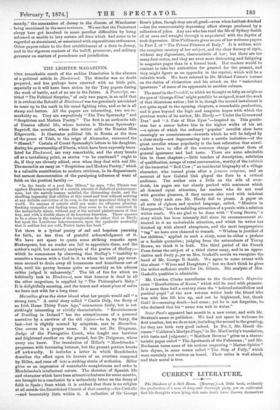ADDITIONAL STATE PAPERS,-1580-1625.*
THE very miscellaneous and fragmentary contents of this Calendar are perhaps chiefly interesting so far as they exemplify the system of espionnage and secret intelligence on which Queen Elizabeth relied for security in the exercise of her high spiritual and temporal
prerogatives. The volume opens in the middle of her reign, a little before the attempted expulsion of the Catholic priests, and in the era, feelingly described in one of the letters, " when the Christian world abroad sounds nothing with greater noise or with more unpleasant bruit in pulpits, books, or common talk, than the late vigorous persecution of the peaceable Catholics of our nation, which most Christian Princes and States, allowing and confessing the same faith, seem much to stomach, or at least to mialike, and sensibly to pity."
We soon come upon a letter of the devoted Jesuit, Edmund Campion, written apparently in November, 1580, and describing the risk of detection he had escaped, "by the help of St. John," on landing at Dover, besides his continued apprehensions of being one day seized. He had afterwards found a shelter in London, where "young gentlemen came in on every hand and embraced him, giving him apparel and weapons ; and he now rode daily in the country, meditating his sermon ; he preached, &c., and was heard greedily." He finds "the country priests virtuous and learned ;" and has the confidence to assert that "it has become a proverb that he must be a Catholic who faithfully pays what he owes ; " and that "there are no men more corrupt and impure than the Protestant ministers." He adds that the Protestants " brag no more of their martyrs, since now we have bishops, lords, knights, the old nobility, the flower of the youth, noble matrons, and innumerable of the inferior sort, either martyrs or dying by imprisonment." During this time the leas stubborn of the Catholic refugees in France were besieging Walsingham with anxious re- quests for leave to revisit their country, or even enter the Queen's service with certain immunities. Charles Paget, who was after- wards a conspirator, wrote word to Elizabeth herself,—
" The declaration your Ambassador has made to me of your pleasure for my return to England engenders in me no small trouble. To make an absolute refusal may seem disobedient, and augment your dis- pleasure. To return, considering the disgrace I remain in with you, gives me fear that either for matters of religion or for untrue informa- tions I shall receive such punishment as may shorten my life or ruin my soul. I know it is not meet for the subject to capitulate with his Sovereign, but by most humble petition I desire your gracious favour and liberty of conscience in religion, which will procure my speedy return, to spend my living and life at your command."
This flattery of the Queen was as fruitless to Paget as a subse- quent attempt to offer a " token " to her Secretary, from whom he received an indignant rebuff.
Meanwhile the emissaries of Walsingham abroad were often encountered with a subtlety rivalling their own ; and the diffi- culties and temptations they encountered may be judged of by the following passage :—
"Coming to Rouen, I consorted with Jacques Servile' searcher of Dieppe, highly favoured by the Governor there. After he had, with French policy, as he supposed, thoroughly sounded me, he brought me acquainted with an Englishman' T. Myttey, one of the Papists' spies. These two resolved that they had found a feather of their own wing,—as, indeed, I seemed to be—told me that they lived in hope to see the Catholic Church flourish again in England, which I confirmed with like trust. 'Marry,' quoth Servile, • there lies a block in the way, which till it be removed, we shall never have our desire effected." Tush I' quoth Myttey, some resolute man or other will at the last despatch that matter.' Then he began to commend me, protesting that I appeared a man fit to be employed in matters of high moment, and if I would return to England and fetch the commendations of Catholics such as he would name, he would pro-
cure me to be held in no small regard with his Holiness and I might make full account to bo used with the assistance of others, for the accomplishment of the great exploit, as they termed it; but there- with they denied to acquaint mo till my return from England."
This repulse did not prevent the informer from obtaining im- portant particulars as to the ways and means by which Servile and his friends maintained a correspondence with their party in England. We cannot dive far into the complex proceedings of Gilbert Gifford, a spy, who was afterwards employed in the matter of Mary Stuart ; but we read of his risking the fatal suspicion of his employers by too boldly tuanceuvring with their adversaries. He writes in 1588 to his fellow-spy, Throgmorton
:- "I had retired to Pont-4-31ousson knowing that Walsingham had threatened, and said in anger, God's death ! never has man been * Cakndar of Slats (Domestic Series) Papers of Me Reigns of Elisabeth and James Addenda, 1680-1625-1)re-served in her Afaiesty's Public Record Office. Edited by Mary Anne Everett Green. Under the Direction of the Master of the Rolls. 1872.
so near cheating me as Gifford.' This was because he thought that under the pretext of making a composition between the Catholics mad those of the religion, I had conspired the death of the Queen."
To the intrigues of the English Court our references in this . Calendar are scanty and indirect. But we have some of Leicester's sanctimonious and sycophantic letters to the Queen, in all which the name he gave himself of her "poor eyes" is whimsically ex- pressed by a pictorial sign. A virulent attack upon his life and character, of which the substance has been preserved and developed in the pamphlet styled "Leicester's Commonwealth," may be found in the private letter signed "R. Z."
During the last years of Elizabeth, when the laws against recusants were made more severe and stringent, our present records contain few remonstrances and petitions, and no very particular notices of prosecutions. But Charles Paget continues to offer the Queen certain services, if she will allow him to live unmolested on his estate in England ; his letters are full of vague promises, which her agents receive with corresponding caution; his pardon is drawn up, but kept back, on his showing some signs of tergiversation ; he is reminded that his delinquen- cies were to have been expiated by some notable disclosures respecting the priests and Jesuits, and he replies that be has only engaged to live peaceably, and to serve the Queen like an ordinary subject.
Among a few documents connected with the disgrace of the Earl of Essex, we may notice a letter to the Earl of Southampton,
written in a very penitential and world-renouncing frame of mind. "I have," he says, "ceased to be a Martha, caring about many things, and believe, with Mary, that one thing is needful. Yon may think this but the vapour of a prisoner, and believe I should do as before, if my fetters were taken away. I would be an apos- tate, hypocrite, and atheist, if I did. I was long a slave to the world, in spite of many callings of grace, and therefore recognise God's justice in dragging me to the marriage feast, and afflicting me in this world, to give me joy in another." This was written in 1599, and consequently before the Earl had made the thneute in London! We come next to the extraordinary letter which Lady Penelope Rich addressed to Elizabeth on her brother's behalf, and of which Lingard has quoted the opening sentence, "I early hoped this morning to have had my eyes blessed with your beauty ; but seeing the same vanish to a cloud, and meeting with spirits that did presage by the wheels of your chariot some thunder in the air, I must express my fears to that divine oracle from whom I re- ceived a doubtful answer." On the margin of this supplication is a rhyme, very possibly composed by the" divine oracle " herself :— " Not to have law is iniquity, Not to mitigate law is tyranny, Mercy without justice is partiality, Injustice without mercy is plain extremity."
The Supplementary State Papers of James I. are of such a minute and trivial character, that we must be content with a single antiquarian gleaning. The King's progress from Edinburgh to London is referred to in a statement of Carlyle respecting Oliver Cromwell, of Hinchiubrook, the uncle of the Protector, who, "besides the ruinously splendid entertainments, gave him [James] hounds, horses, and astonishing gifts at his departure. In return for this there were knights created,—Sir Oliver first of the batch, we may suppose." We may add from our present sources that Sir Oliver was furthermore rewarded with the keepership of the game in two specified forests and two parks, and elsewhere in the comities of Huntingdon and Cambridge, and within five miles of Babrahatn, and subsequently with the privileges of hunting in all the Royal demesnes. There are incidental notices of his wife and her former husband, Sir Horatio Pallavicini, who seems to have been a trusty agent of Queen Elizabeth's.
Through the whole of this volume we encounter a very large proportion of papers relating to the Channel Isles, and exem- plifying the history of their administration, fortifications, &c., in a manner which will be highly interesting to local investigators. Near the commencement we find some appeals against Guernsey magistrates presented to the Council in England, who insist on receiving them, although the claim is regarded as novel and repugnant to the Norman law. Sark had been recently colonised from Jersey (1567) ; and a singular attempt had been made by a Philip de Carteret to obtain an old-fashioned feudal jurisprudence in that little island. We are surprised to End Jersey described as a poor, ill-cultivated island, in James's reign, and to read that a quarter of the Militia were armed with " walch-hooks (a kind of forest bills) and with slings," instead of firearms. We do not understand the abridged statement that since the Reformation the "conduct of the Church had been ordered to be like that of the Reformed Churches of Nor- mandy," the annexation of Jersey to the diocese of Winchester being mentioned in the same sentence. We see that the Protestant clergy here got involved in some peculiar difficulties by being ashamed or unable to levy certain old dues which had come to be regarded as simoniacal, or associated with superstitious ordinances. Other papers relate to the first establishment of a dean in Jersey, and to the vigorous contests of the bailiff, procureur, and military governor on matters of precedence and jurisdiction.



































 Previous page
Previous page